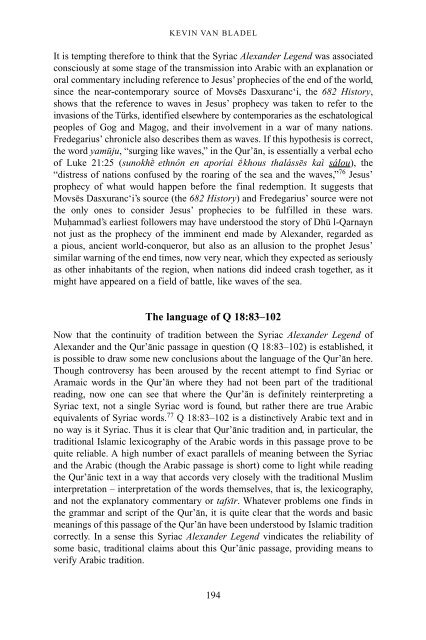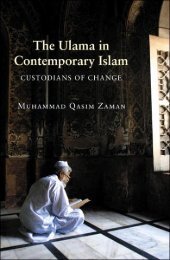The Qur'an in its historical context (pdf - Islam and Christian-Muslim ...
The Qur'an in its historical context (pdf - Islam and Christian-Muslim ...
The Qur'an in its historical context (pdf - Islam and Christian-Muslim ...
You also want an ePaper? Increase the reach of your titles
YUMPU automatically turns print PDFs into web optimized ePapers that Google loves.
KEVIN VAN BLADEL<br />
It is tempt<strong>in</strong>g therefore to th<strong>in</strong>k that the Syriac Alex<strong>and</strong>er Legend was associated<br />
consciously at some stage of the transmission <strong>in</strong>to Arabic with an explanation or<br />
oral commentary <strong>in</strong>clud<strong>in</strong>g reference to Jesus’ prophecies of the end of the world,<br />
s<strong>in</strong>ce the near-contemporary source of Movses Dasxuranc‘i, the 682 History,<br />
shows that the reference to waves <strong>in</strong> Jesus’ prophecy was taken to refer to the<br />
<strong>in</strong>vasions of the Türks, identified elsewhere by contemporaries as the eschatological<br />
peoples of Gog <strong>and</strong> Magog, <strong>and</strong> their <strong>in</strong>volvement <strong>in</strong> a war of many nations.<br />
Fredegarius’ chronicle also describes them as waves. If this hypothesis is correct,<br />
the word yamuju, “surg<strong>in</strong>g like waves,” <strong>in</strong> the Qur’an, is essentially a verbal echo<br />
of Luke 21:25 (sunokhè ethnôn en aporíai ékhous thalásses kaì sálou), the<br />
“distress of nations confused by the roar<strong>in</strong>g of the sea <strong>and</strong> the waves,” 76 Jesus’<br />
prophecy of what would happen before the f<strong>in</strong>al redemption. It suggests that<br />
Movses Dasxuranc‘i’s source (the 682 History) <strong>and</strong> Fredegarius’ source were not<br />
the only ones to consider Jesus’ prophecies to be fulfilled <strong>in</strong> these wars.<br />
Muhammad’s earliest followers may have understood the story of Dhu l-Qarnayn<br />
not just as the prophecy of the imm<strong>in</strong>ent end made by Alex<strong>and</strong>er, regarded as<br />
a pious, ancient world-conqueror, but also as an allusion to the prophet Jesus’<br />
similar warn<strong>in</strong>g of the end times, now very near, which they expected as seriously<br />
as other <strong>in</strong>habitants of the region, when nations did <strong>in</strong>deed crash together, as it<br />
might have appeared on a field of battle, like waves of the sea.<br />
<strong>The</strong> language of Q 18:83–102<br />
Now that the cont<strong>in</strong>uity of tradition between the Syriac Alex<strong>and</strong>er Legend of<br />
Alex<strong>and</strong>er <strong>and</strong> the Qur’anic passage <strong>in</strong> question (Q 18:83–102) is established, it<br />
is possible to draw some new conclusions about the language of the Qur’an here.<br />
Though controversy has been aroused by the recent attempt to f<strong>in</strong>d Syriac or<br />
Aramaic words <strong>in</strong> the Qur’an where they had not been part of the traditional<br />
read<strong>in</strong>g, now one can see that where the Qur’an is def<strong>in</strong>itely re<strong>in</strong>terpret<strong>in</strong>g a<br />
Syriac text, not a s<strong>in</strong>gle Syriac word is found, but rather there are true Arabic<br />
equivalents of Syriac words. 77 Q 18:83–102 is a dist<strong>in</strong>ctively Arabic text <strong>and</strong> <strong>in</strong><br />
no way is it Syriac. Thus it is clear that Qur’anic tradition <strong>and</strong>, <strong>in</strong> particular, the<br />
traditional <strong>Islam</strong>ic lexicography of the Arabic words <strong>in</strong> this passage prove to be<br />
quite reliable. A high number of exact parallels of mean<strong>in</strong>g between the Syriac<br />
<strong>and</strong> the Arabic (though the Arabic passage is short) come to light while read<strong>in</strong>g<br />
the Qur’anic text <strong>in</strong> a way that accords very closely with the traditional <strong>Muslim</strong><br />
<strong>in</strong>terpretation – <strong>in</strong>terpretation of the words themselves, that is, the lexicography,<br />
<strong>and</strong> not the explanatory commentary or tafsir. Whatever problems one f<strong>in</strong>ds <strong>in</strong><br />
the grammar <strong>and</strong> script of the Qur’an, it is quite clear that the words <strong>and</strong> basic<br />
mean<strong>in</strong>gs of this passage of the Qur’an have been understood by <strong>Islam</strong>ic tradition<br />
correctly. In a sense this Syriac Alex<strong>and</strong>er Legend v<strong>in</strong>dicates the reliability of<br />
some basic, traditional claims about this Qur’anic passage, provid<strong>in</strong>g means to<br />
verify Arabic tradition.<br />
194



